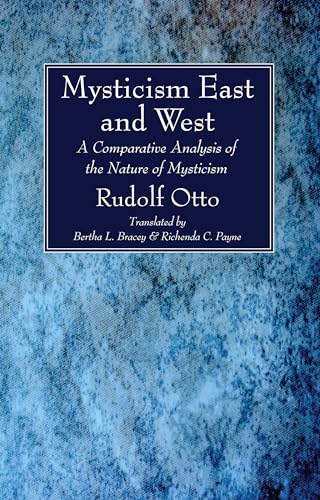Mysticism East and West
A Comparative Analysis of the Nature of Mysticism
Rudolf Otto
BOOK REVIEW

In the heart of human experience lies the ineffable quest for connection with the divine-a longing that traverses cultures, time, and ideology. Mysticism East and West: A Comparative Analysis of the Nature of Mysticism by Rudolf Otto serves as a profound exploration into this intricate web of spiritual understanding, revealing not just the common threads woven through diverse religious practices, but also the unique flavors that each tradition contributes to the essence of mysticism. This book is not simply a scholarly endeavor; it is a passionate call for introspection that urges you to delve deep into your own beliefs and experiences. 🌌
Rudolf Otto, a luminary in the field of religious studies, bravely ventures into the heart of mysticism, mapping out the often nebulous terrain that separates Eastern and Western perspectives. He is known for his evocative concept of the numinous, a term that captures that indescribable feeling of being touched by something greater than ourselves. In laying out this analysis, Otto threads together the philosophies of venerable traditions-Hinduism, Buddhism, and Taoism on one side, and Christianity, Judaism, and Islam on the other. Through Otto's eyes, you begin to see mysticism not as an isolated phenomenon but as a shared human heritage.
Diving into his comparative study, you'll encounter how each tradition uniquely approaches the search for divine communion. In the East, mysticism often revolves around the inward journey through meditation and self-realization, while the West tends to focus on the relationship with a personal God, emphasized by prayer and doctrine. This juxtaposition compels you to explore how cultural contexts shape these spiritual pursuits, pushing against the boundaries of your preconceptions. The book doesn't merely present theories; it provokes a visceral reaction, urging you to reflect on your spiritual path and encouraging you to embrace the unfamiliar.
As you traverse the pages, consider Otto's poignant insights on how mystics from each tradition describe their encounters with the divine. With language that blurs the lines of prose and poetry, you may find yourself enveloped in the ecstatic experiences he articulates so beautifully. Visualize these mystics lost in transcendent states: the Sufi twirling in a dance of devotion, the Buddhist sage in silent meditation, the Christian contemplative absorbed in divine love. The emotional weight of their experiences is palpable, igniting a yearning within you to connect with that profound sense of oneness with the universe. 🌠
Critics of Otto's work suggest that his analysis, while comprehensive, sometimes skims over the complexities of individual experiences within these traditions. Others argue that by attempting to draw parallels, he risks oversimplifying deeply rooted beliefs. Yet, isn't part of the beauty of this text the way it invites dialogue? It stirs the pot of thought, compelling both scholar and seeker to discuss, to debate, and ultimately to appreciate the diversity of spiritual expression.
Reading this book is an invitation to high-stakes contemplation. You'll find it laced with moments that shock and awaken-the realization that the divine is not a distant deity but an intimate presence that envelops us all. Otto challenges you to confront your own understanding of what it means to be spiritual in a world that can often feel chaotic and disconnected.
The cultural and historical contexts of Otto's era cannot be overlooked. Written during a time when the world was grappling with the aftermath of the First World War, his work resonates with a collective yearning for peace, understanding, and unity. It's impossible not to draw parallels between that tumultuous period and today's global struggles. As we face our own existential crises, Otto's insights offer a balm, reminding us of our shared humanity and the profound mysteries we each encounter on our spiritual journeys.
Mysticism East and West is not merely a textbook; it's a catalyst-a clarion call that inspires curiosity and evokes passion. By the time you reach the final page, you may find yourself questioning not only the nature of mysticism but the very essence of your existence. 💫
This book has influenced countless spiritual leaders and thinkers, including the likes of Carl Jung and Martin Buber, who have utilized Otto's insights to further their explorations of the psyche and the Jewish mystical experience, respectively. Such is the legacy of Otto: a bridge across beliefs that transforms the mundane into the miraculous.
In this world rife with division and misunderstanding, Mysticism East and West serves as a powerful reminder that beneath our varied expressions of faith lies a universal quest for meaning. Embrace the challenge-allow Otto's words to penetrate your consciousness and ignite a fervor for discovery that promises to reverberate throughout your life. 🌍✨️
📖 Mysticism East and West: A Comparative Analysis of the Nature of Mysticism
✍ by Rudolf Otto
🧾 280 pages
2016
#mysticism #east #west #comparative #analysis #nature #mysticism #rudolf #otto #RudolfOtto